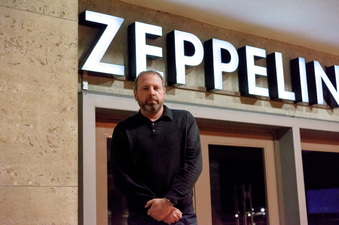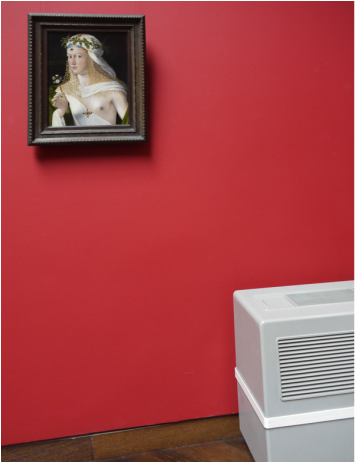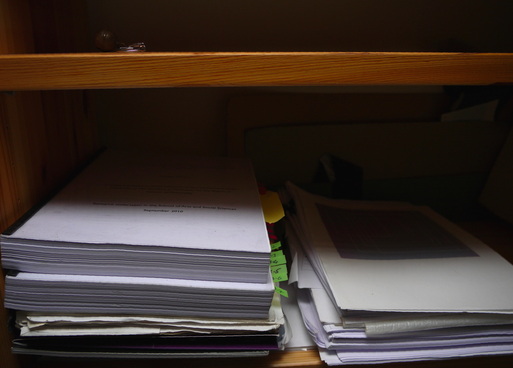#2: Ambitions, effects
Can you elaborate on the role artistic research plays in you practice today?
It’s a significant consideration, and is now embedded in my approaches – but whether this is good thing or not is unclear to me. It often becomes more overt when it informs the bureaucratic elements of my working life – writing proposals, non-teaching university work, etc., rather than in studio/working practices, or direct teaching.
What role do you feel it should play in academia?
As a legitimate form of knowledge, it could be involved productively much more in academia – there are problems of perception, and some resistance – for example, it is hard for German academia to understand practice-led and artistic research, even in a progressive institiution… however, I have been involved in university-initiated teaching research projects which have explored artistic research and creative practice in the context of the wider university curriculum – projects about experience rather than outcomes.
An issue in the UK is the increasing academicisation of the long-established art schools, many of which have roots within the artisan and craft cultures of the nineteenth century, and the balance seems to be tipping toward the academic. (This is also a function of the way institutions are organised and/or affiliated as much as a strategic shift). There’s a discussion there… what kind of impact does the PhD or research culture have on the wider culture of the art school?
If you take an average working week, what percentages would be your estimated time-investment in the activities below, in the past year?
If your entire work week would be 100%, how would you divide this?
Artistic research (reading, experimenting, attending conferences, visiting exhibitions etc.) 10%
Artistic production (executing work, exhibitions etc.) 20%
Academic work (publications, presentations etc.) 20%
Teaching (curriculum development, meetings etc.) 20%
Other work 30%
Are you content with this division?
No
Which are your long term ambitions?
A secure long term teaching/research position, and one which provides a platform to develop and support practice-led research. At present I have several jobs in several contexts – artist, writer, researcher, teacher, curator - which often don’t mesh usefully or productively…
#1: locality
The PhD experience produces a kind of identity crisis, or at least I found this to be the case. Artists working visually shift to being artists who also work textually, one is unclear as to whether one is an artist, or a writer, or a researcher, or all of these… a kind of process of advanced self-interrogation and deployment informs one's practice, often useful, but not always. I think I am less an artist now, but more of other things.
I now work in Germany and live in the UK, and identity is further tested and sliced. I transit with the peacocks of Frankfurt, through 'business' lounges, despite not being 'business'. I am a gastarbeiter, albeit a privileged one, and probably unnoticed. I like the distance and novelty, the displacement. There is some socio-economic advantage, accrued through the status of a PhD, invented and valued highly in Germany, and this allows me to occupy a position in an elite university, operating under my own terms, an opportunity which I feel sure would not be open to me otherwise. I am a 'legitimate' knowledge worker.
About Dr. Andrew McNiven
Personal website
Can you elaborate on the role artistic research plays in you practice today?
It’s a significant consideration, and is now embedded in my approaches – but whether this is good thing or not is unclear to me. It often becomes more overt when it informs the bureaucratic elements of my working life – writing proposals, non-teaching university work, etc., rather than in studio/working practices, or direct teaching.
What role do you feel it should play in academia?
As a legitimate form of knowledge, it could be involved productively much more in academia – there are problems of perception, and some resistance – for example, it is hard for German academia to understand practice-led and artistic research, even in a progressive institiution… however, I have been involved in university-initiated teaching research projects which have explored artistic research and creative practice in the context of the wider university curriculum – projects about experience rather than outcomes.
An issue in the UK is the increasing academicisation of the long-established art schools, many of which have roots within the artisan and craft cultures of the nineteenth century, and the balance seems to be tipping toward the academic. (This is also a function of the way institutions are organised and/or affiliated as much as a strategic shift). There’s a discussion there… what kind of impact does the PhD or research culture have on the wider culture of the art school?
If you take an average working week, what percentages would be your estimated time-investment in the activities below, in the past year?
If your entire work week would be 100%, how would you divide this?
Artistic research (reading, experimenting, attending conferences, visiting exhibitions etc.) 10%
Artistic production (executing work, exhibitions etc.) 20%
Academic work (publications, presentations etc.) 20%
Teaching (curriculum development, meetings etc.) 20%
Other work 30%
Are you content with this division?
No
Which are your long term ambitions?
A secure long term teaching/research position, and one which provides a platform to develop and support practice-led research. At present I have several jobs in several contexts – artist, writer, researcher, teacher, curator - which often don’t mesh usefully or productively…
#1: locality
The PhD experience produces a kind of identity crisis, or at least I found this to be the case. Artists working visually shift to being artists who also work textually, one is unclear as to whether one is an artist, or a writer, or a researcher, or all of these… a kind of process of advanced self-interrogation and deployment informs one's practice, often useful, but not always. I think I am less an artist now, but more of other things.
I now work in Germany and live in the UK, and identity is further tested and sliced. I transit with the peacocks of Frankfurt, through 'business' lounges, despite not being 'business'. I am a gastarbeiter, albeit a privileged one, and probably unnoticed. I like the distance and novelty, the displacement. There is some socio-economic advantage, accrued through the status of a PhD, invented and valued highly in Germany, and this allows me to occupy a position in an elite university, operating under my own terms, an opportunity which I feel sure would not be open to me otherwise. I am a 'legitimate' knowledge worker.
About Dr. Andrew McNiven
Personal website



